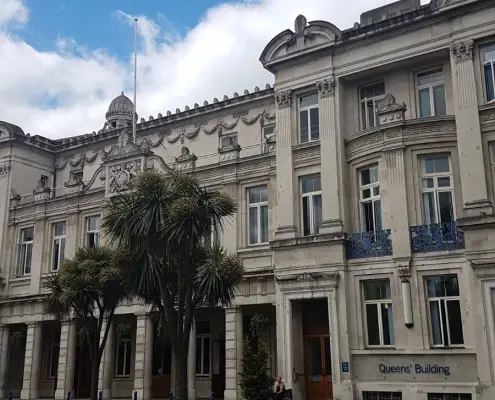Queen Mary University of London
Queen Mary University of London
Academic excellence in a centrally located London campus
+ 33 6 60 64 19 57
Besoin d’aide ? Discutons de votre projet d’études à l’étranger !

Queen Mary University of London (QMUL) is unique in that it is the only campus-based Russell Group University in London. It has 23,120 undergraduate and postgraduate students studying across the humanities and social sciences, science and engineering, and medicine and dentistry. Located in the bustling areas of east and central London, Queen Mary is one of the UK’s leading research-focused universities and places in the top 50 in the UK University Ranking 2019. Queen Mary’s place amongst the UK university powerhouses is solidified through its outstanding international reputation for research.
According to the most recent Research Excellence Framework, carried out in 2014, Queen Mary places 5th in the UK for the percentage of research outputs ranked 4* and 3*. It also ranks 9th in the UK, amongst multi-faculty institutions, for the sheer quality and excellence of its research.

Calling all international students
The university is a great destination for international students looking to study in the UK. Queen Mary promotes diversity and therefore prides itself on having its doors open to people of all backgrounds: 44% of students are from overseas and its diverse community of staff and students represent over 160 different countries from around the world.
History and campus
The university was formed from the merger of 4 historic London institutions: Queen Mary College, Westfield College, St Bartholomew’s Hospital Medical College and The London Hospital Medical College, which means that its five campuses span such different and diverse areas of England’s capital as Whitechapel, Charterhouse Square, West Smithfield and Regent’s Canal. A university experience in the heart of London … what else could you want?
Well, there’s more to get excited about! Queen Mary’s main campus, called Mile End, is one of the largest independent university campuses in London. Situated right by the Regent’s Canal, the campus offers a vast array of features: a 24-hour library, four computer labs, an arts quarter, as well as providing access to a plethora of bars, cafes and sports pitches. One student notes, “It’s nice having everything all in one location at the Mile End campus. There’s a real sense of community. Campus is almost like its own little village- our own little space in London” (Zoe – QMUL website). The main library of the university is also located on the Mile End campus, with Whitechapel and West Smithfield being host to the medical libraries.
Well, there’s more to get excited about! Queen Mary’s main campus, called Mile End, is one of the largest independent university campuses in London. Situated right by the Regent’s Canal, the campus offers a vast array of features: a 24-hour library, four computer labs, an arts quarter, as well as providing access to a plethora of bars, cafes and sports pitches. One student notes, “It’s nice having everything all in one location at the Mile End campus. There’s a real sense of community. Campus is almost like its own little village- our own little space in London” (Zoe – QMUL website). The main library of the university is also located on the Mile End campus, with Whitechapel and West Smithfield being host to the medical libraries.
The local area
It is worth noting that East London has been transformed in recent years given the large quantity of structural development and improvement as well as an influx of commercial and residential property investment. It has been tipped as “one of the most exciting parts of London” by British GQ magazine and boasts an unrivalled culinary and social hub for students. Queen Mary can offer guaranteed accommodation for all its first-year students in prime London location: each room comes with Internet access and an en-suite bathroom, and all have access to Wi-Fi across each of their five campuses using the eduroam network.
Academic Matters
On the academic side of things, Queen Mary thrives. According to the QS Subject Rankings 2018, the university places top 50 in the world in English, Drama and Law. Success in areas such as these, in combination with the international excellence that characterizes Queen Mary’s research department, should demonstrate the validity of the claim that this university poses as a first-choice pick for those applying to university and who are seeking to study in London.
STUDENT LIFE
Queen Mary home to one of the most successful Student Unions in the country, whose motto is “Together we improve students’ lives”. What the union has on offer may range from Sports and Fitness opportunities, through to an Academic Advice Service, as well as providing a host of social spaces: a multifaith centre, restaurants and a variety of lively drink spots such as The Griffin Inn bar and kitchen and The Shield.
The Union offers groups and societies that range from volunteering to the participation in sports teams. The societies and events that take place here in the Student Union are a starting point for others: in 2019, Queen Mary was lucky enough to welcome none other than Microsoft founder Bill Gates to come to speak on his roles as “world-leading technologist, business leader and philanthropist”, as The Complete University Guide 2019 notes. With figures such as Bill Gates gracing the grounds of Queen Mary you know the university means business! If the prospect of living and working in London seems attractive, then it may well be the university for you.
How do I apply?
Queen Mary University of London requires strong academic results and rigorous preparation is needed.
What are the different stages of the application?
There are several steps:
- Application
- Conditional offer
- Acceptance
The details of these steps are covered below.


How do I apply?
How to begin an application:
Candidates apply via the British online platform UCAS, and upload a letter of motivation (Personal Statement), their predicted exam marks, and a letter of recommendation from one of their teachers. Students may only submit one Personal Statement for all the universities they apply for (maximum of 5 choices). The Personal Statement, no more than 4,000 characters, should explain why students want to study their chosen course, what aspects particularly interest them, what steps they have already taken to engage with the subject (reading, conferences, internships etc), and, if possible, what aspects they are looking forward to studying.
Conditional offer and acceptance:
If students succeed in all these stages, in January they will receive a ‘conditional offer’ of admission. This means that they will be accepted if they attain the required marks (most often a high grade in your end of high school studies, and in a standardized English exam: 7.5 in the IELTS for example).

What is the deadline for applying?
Deadlines:
The deadline for applications to Queen Mary University of London is 15th January of a students’ final year of secondary school or sixth-form college (Year 12).
When do you have to start preparing for Queen Mary University of London?
It is strongly recommended that students begin preparing from the end of Year 11 or beginning of Year 12. If possible, start any reading and thinking about what to write about in a Personal Statement as early as possible. Some candidates, particularly those with a weaker level of English, need to consider preparing even earlier. See this link for useful information for international candidates.
It is recommended that students try to find aspects of their chosen course that genuinely interest them and to think deeply about why they wish to study this subject – after all, students are applying to study this subject full time for at least 3 years.
Is it possible to visit the campus?
Open day at Queen Mary is 5th October 2019. Registration is not necessary, although students may need to register for the most popular sessions. For more information, see this page.


What is the profile of the students at QMUL?
Because of the high selectivity of the university, we recommend to apply to this university only if yo can show strong academic results and you are sure to obtain at least a Mention ‘Assez Bien’ grade in the Baccalaureate.
Moreover, you must also show an excellent command of the English language.

Fees
Fees 2019-2020*
| EU students | International Non-EU Students | |
| Undergraduate Tuition Fees | £9,250 per year for all courses | Between £24,750 and £34,678 per year, depending on the subject (see individual course pages for details).Costs for Medicine will be considerably higher: £27,24 per year for the first three years (pre-clinical years), and £37,445 per year for years 5 and 6 (clinical years). |
| ‘College fee’ | £0 | International students must also pay a ‘College fee’ of £7,570 |
When taking into account the cost of any university, you should also consider the cost of living.
When taking into account the cost of any university, you should also consider the cost of living.
Oxford provides an estimate for the cost of living, which can be found on its website: they advise budgeting between £1,058 and £1,643 for each month that you are in Oxford. You should budget this amount for 6-9 months of the year, depending on whether you will be staying at Oxford during the holidays.
From this, you might predict an annual average budget of around £10,567 per year, including accommodation, transport, personal expenses etc.
Are you ready to study at Amsterdam University College ?
Nous sommes là pour
vous aider

